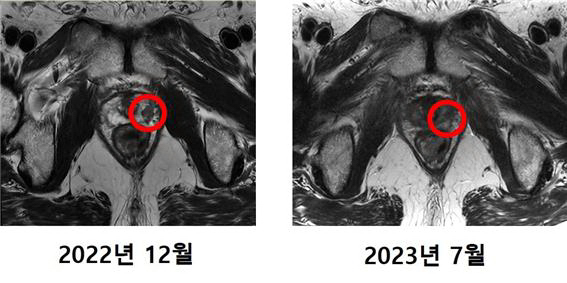Severance Hospital’s Yonsei Cancer Center announced the promising results of heavy ion therapy performed on a patient diagnosed with stage 2 prostate cancer, marking a significant milestone in the nation's medical field.

Heavy ion therapy involves accelerating heavy carbon ions to 70 percent of the speed of light to target and destroy cancer cells.
During a routine health screening, the 64-year-old patient, surnamed Choi, was diagnosed with stage 2 prostate cancer last year.
Choi's Gleason score, which rates the aggressiveness of prostate cancer on a scale of 5, stood at grade 3 - just below the threshold for high-risk classification and his Prostate Specific Antigen (PSA) level, a key marker used to measure the risk of prostate cancer, was noted at 7.9ng/mL, significantly higher than the average 4ng/mL for individuals in their 60s.
After commencing treatment in late April, Choi underwent 12 sessions of heavy ion therapy, wrapping up all treatments by mid-May. To protect adjacent organs from potential harm, the hospital injected a unique substance called Space OAR, A polyethylene glycol (PEG) based hydrogel, between the prostate and the rectum, reducing the risk of organ damage, bleeding, and related complications.
According to Severance Hospital, post-treatment evaluations have been encouraging as Choi's PSA levels have drastically reduced to below 0.01ng/mL, and MRI scans detected no traces of cancerous tissues.
The hospital also stressed that the heavy ion therapy exhibited no collateral damage to surrounding organs.
Another patient, who received the heavy ion therapy around the same time as Choi, also showed no remaining signs of cancerous tissues in subsequent tests and a PSA level of 5.5ng/mL.
"The treatment outcomes for the first-ever heavy ion therapy recipients for prostate cancer in Korea showed excellent results," said Professor Lee Ik-jae, director of the Heavy Ion Therapy Center at Yonsei Cancer Center. "We will continue to monitor the progress of our patients and ensure their well-being."
Related articles
- Yonsei's lung cancer team recognized as Asia's best multidisciplinary team at WCLC 2023
- Severance Hospital develops new blood test to detect breast cancer-related genes
- Yonsei researchers develop AI system for analyzing ASD severity
- Nature recognizes Yonsei University Health System among 'Top 100 Cancer Research Hospitals'

